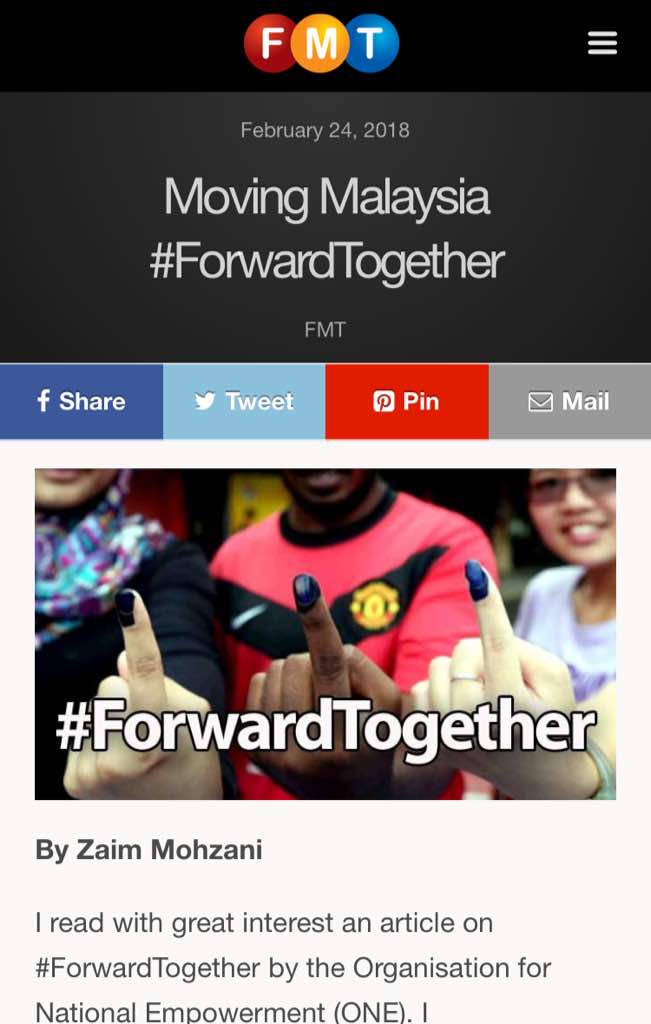|
I read with great interest an article on #ForwardTogether by the Organisation for National Empowerment (ONE). I wholeheartedly agree with their call for the electorate to “vote for a party which you believe can take us ahead.” At a time of uncertainty, there is a need to understand the civic deficit involving young people, its consequences, and what we can do to address it. Civic crisis among young people in Malaysia The controversy surrounding the #UndiRosak movement is a reflection of the civic health in Malaysia. Young Malaysians are increasingly frustrated about the excessive political bickering among politicians from both sides of the divide while others have been turned off by politics. A recent Merdeka Centre poll commissioned by Watan (youth voter registration NGO) found 71% of young voters felt they have no influence on government. It is no surprise, then, that 65% of all unregistered voters are between 21 and 30 years old — a whopping 2.5 million. While I respect the proponents of #UndiRosak and their legitimate grievances, I disagree with their approach. Spoiling one’s vote, even to send a message to the politicians, is ineffective. Lack of youth participation and vicious cycle of neglect The reality is politicians respond to voters. When young people are disillusioned, they stay out of the political process. As a result, they don’t vote in elections in large numbers (or if they do, they spoil their votes). In turn, political parties make little effort to engage young people as there is little incentive to gain their votes. This creates a vicious cycle of neglect of young people. The consequences can be detrimental for the youth. In the United States, only half of the young eligible electorate participated in the last presidential election, culminating in the rise of President Donald Trump. In the Brexit referendum, close to half of young British voters chose to stay at home. In extreme cases, political parties have discounted young people altogether. In the Netherlands, the 50PLUS party caters solely to pensioners and doubled their votes and representatives recently due to the lack of youth participation. Young voters cannot afford to risk our country’s future as we will be living in it, not our older counterparts. The young can make a difference through the ballot box We should not underestimate our power as young voters because we have the numbers. In the last general election, it was estimated that first-time voters (including yours truly) made up one-fifth of the 13.3 million eligible voters. The young are a powerful voting bloc, and we can influence the outcome of the election. Our collective power can pressure politicians from both sides to address youth issues such as affordable housing, cost of living, and career opportunities. It is easy for us to feel detached and confused from the national political discourse, dominated by old personalities. Therefore, during the election, it is crucial that we focus on our local community. Personally, I make a decision between the competing candidates based on their personality and track record, not their political parties. It is crucial we carefully select our state assemblyperson (ADUN) and member of parliament (MP) for they will be responsible for our community. Whoever it is, when you are at the ballot box, make a decision — don’t waste it. Despite the pessimism towards politics, we must remember our actions will have repercussions on our generation and future generations. Our country may not be a perfect democracy but it works. We have the room and space to make a difference as citizens. At times of uncertainty, we can appreciate responsible and balanced calls such as from ONE on #ForwardTogether for voters to make objective and well-informed decisions. In the words of American feminist Gloria Steinem, “Voting isn’t the most we can do. But it is the least.” You can find this article on Free Malaysia Today at http://www.freemalaysiatoday.com/category/opinion/2018/02/24/moving-malaysia-forwardtogether/
1 Comment
Leave a Reply. |
Categories
All
Archives
May 2024
|

 RSS Feed
RSS Feed
